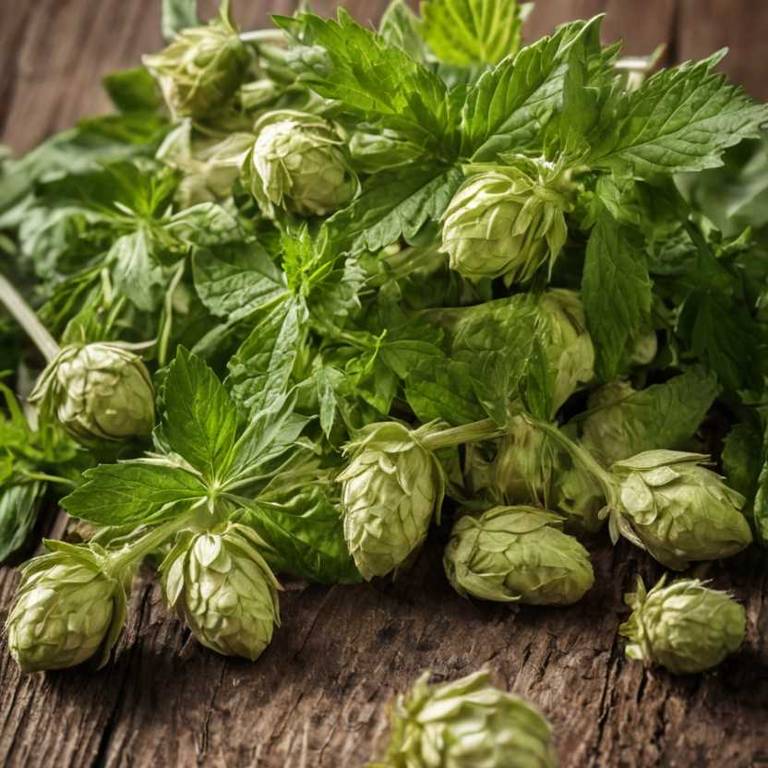By Leen Randell
Updated: Jul 20, 2024
10 Medicinal Constituents Of Humulus Lupulus (Hops)

Humulus lupulus has active constituents such as lupulin, flavonoids, and alpha acids.
These constituents possess antimicrobial, anti-inflammatory, and antioxidant properties. The alpha acids have been shown to improve sleep quality, reduce anxiety, and alleviate symptoms of insomnia. The flavonoids exhibit neuroprotective effects, potentially mitigating age-related cognitive decline.
The overall medicinal properties of hops have been associated with enhanced mental well-being, improved sleep, and potentially even reduced risk of neurodegenerative diseases.
This article explains in details the 10 best active constituents of Humulus lupulus.
1. Lupulone
Humulus lupulus lupulone is a key compound found in the plant's female flowers.
It is a bitter acid responsible for the distinctive flavor and aroma of beer, contributing to its characteristic bitterness and foam retention.
Lupulone is a major component of hop extracts used in brewing, and its unique properties make it an essential ingredient in craft beers worldwide, providing depth and complexity to the overall taste experience.
2. Humulone
Humulus lupulus humulone is a type of alpha acid found in the flowers and leaves of the hop plant.
It is responsible for the bitter flavor and aroma of beer, playing a crucial role in the brewing process.
Humulone is extracted from hops during the brewing process and is used to balance out the sweetness of the malted grains, resulting in a perfectly balanced taste.
3. Caryophyllene
Humulus lupulus caryophyllene is a sesquiterpene compound that is responsible for the distinct flavor and aroma of beer.
Found in the flowers of the hop plant, caryophyllene has been used for centuries in traditional medicine due to its anti-inflammatory and antiseptic properties.
It is also believed to have a calming effect on the nervous system and has been used to treat anxiety and insomnia.
4. Falcarinol
Humulus lupulus falcarinol is a bioactive compound found in its leaves and cones.
This sesquiterpene lactone has been extensively studied for its potential health benefits, including antioxidant, anti-inflammatory, and antimicrobial properties. Falcarinol has been shown to have protective effects on the liver and kidneys, as well as exhibit antiviral activity against certain viruses.
Its unique chemical structure also makes it a promising candidate for use in pharmaceuticals and cosmetic products.
5. Sesquiterpenes
Humulus lupulus sesquiterpenes is a class of natural compounds found in its flowers and cones.
These bioactive molecules have been extensively studied for their potential health benefits, including anti-inflammatory, antimicrobial, and antioxidant properties.
Sesquiterpenes have also been shown to exhibit sedative and anxiolytic effects, which may contribute to the calming and relaxing effects associated with beer consumption.
6. Linalool
Humulus lupulus linalool is a significant constituent of its essential oil.
This terpenoid compound is responsible for the plant's characteristic bitter flavor and aroma, making it a crucial ingredient in beer brewing. Linalool has been extensively studied for its potential therapeutic properties, including sedative, anti-inflammatory, and antimicrobial effects.
Its unique combination of flavors and bioactive compounds make Hops a valuable resource in traditional medicine and modern research applications.
7. Beta-caryophyllene
Humulus lupulus beta-caryophyllene is a sesquiterpene compound found in the resinous glands of its flowers and leaves.
This unique chemical structure is responsible for the characteristic aroma and flavor of hops used in beer brewing.
Beta-caryophyllene has been shown to possess various biological activities, including anti-inflammatory, antiseptic, and antioxidant properties, making it a valuable ingredient in traditional medicine and pharmaceutical applications.
8. Alpha-humulene
Humulus lupulus alpha-humulene is a sesquiterpene compound found in the flowers of the hop plant.
It is one of the most abundant and potent terpenes present in hops, responsible for imparting bitterness and flavor to beer.
Alpha-humulene has been reported to possess a range of bioactive properties, including anti-inflammatory, antimicrobial, and antioxidant activities, which have been linked to potential therapeutic applications beyond its traditional use in brewing.
9. Lupulin
Humulus lupulus lupulin is a resinous, yellowish-green substance found within the female flowers of the hop plant.
It contains oils and acids that give beer its unique flavor, aroma, and bitterness.
Lupulin is responsible for the characteristic hoppy taste in beer and is often used to flavor and preserve beer during the brewing process.
10. Isolupulone
Humulus lupulus isolupulone is a unique compound derived from the cones of the hop plant.
It is a minor constituent of alpha-acids, responsible for bitterness in beer, and has been gaining attention for its potential health benefits.
Isolupulone has been shown to exhibit anti-inflammatory, antioxidant, and antimicrobial properties, making it a promising natural remedy for various diseases.